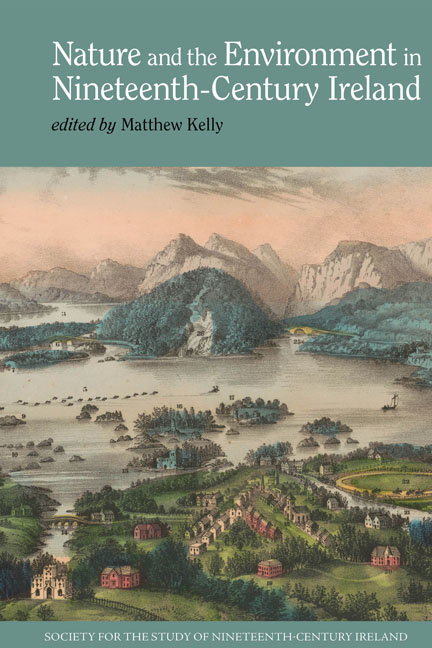Book contents
- Frontmatter
- Contents
- Acknowledgements
- List of Figures
- List of Tables
- List of Contributors
- Introduction
- 1 The Nature of Improvement in Ireland
- 2 Palmerston’s Conquest of Sligo
- 3 ‘A Voice for Ireland’: Isaac Butt, Environmental Justice, and the Dilemmas of the Irish Land Question
- 4 ‘In the Open Country’: Nature and the Environment during the ‘Monster’ Meeting Campaign of 1843
- 5 Therapeutic Environments in Nineteenth-Century Ireland: Hybrid Spaces and Practices
- 6 On Why the UK’s First National Park Might Have Been in Ireland
- 7 Towards an Environmental History of Nineteenth-Century Dublin
- 8 Mainstream or Tributary? The Question of ‘Hibernian’ Fishes in William Thompson’s The Natural History of Ireland (1849–56)
- 9 The Ocean of Truth: Atlantic Imagery in Emily Lawless’s Major Lawrence, F.L.S. (1885) and Grania: The Story of an Island (1892)
- 10 Seumas O’Sullivan and Revivalist Nature Poetry
- Index
1 - The Nature of Improvement in Ireland
- Frontmatter
- Contents
- Acknowledgements
- List of Figures
- List of Tables
- List of Contributors
- Introduction
- 1 The Nature of Improvement in Ireland
- 2 Palmerston’s Conquest of Sligo
- 3 ‘A Voice for Ireland’: Isaac Butt, Environmental Justice, and the Dilemmas of the Irish Land Question
- 4 ‘In the Open Country’: Nature and the Environment during the ‘Monster’ Meeting Campaign of 1843
- 5 Therapeutic Environments in Nineteenth-Century Ireland: Hybrid Spaces and Practices
- 6 On Why the UK’s First National Park Might Have Been in Ireland
- 7 Towards an Environmental History of Nineteenth-Century Dublin
- 8 Mainstream or Tributary? The Question of ‘Hibernian’ Fishes in William Thompson’s The Natural History of Ireland (1849–56)
- 9 The Ocean of Truth: Atlantic Imagery in Emily Lawless’s Major Lawrence, F.L.S. (1885) and Grania: The Story of an Island (1892)
- 10 Seumas O’Sullivan and Revivalist Nature Poetry
- Index
Summary
The history of ‘nature’ in early nineteenth-century Ireland is inextricable from that of ‘improvement’. In ways at odds with, or even opposed to, nature by seeking its transformation into society, Irish improvement was principally associated with the rationalizing of agricultural practice and the efficient management of natural resources. Improvers, those advocating and working towards cultivation and thus maximization of resources, were of course seeking to instil particular scientific approaches as widely as possible. But they were also striving to lessen Irish difference by improved means, working towards the eventual absorption of Ireland into the anglicized and homogenized mainstream. Improvement thus required the addressing of a range of social questions and moving beyond strictly material or environmental matters. Indeed, as a term that gradually came to connote an imminently practical approach to numerous social as well as infrastructural problems, ‘improvement’ was deployed in government reports, surveys, tracts, Dublin Society prize essays, novels, short fiction, and the numerous agricultural guides that were widely disseminated throughout the country. Hence, in the post-Union period, improvement became as much associated with social as with ‘natural’ issues. In fact, social questions were addressed as though they were essentially—or at least ought to be—entirely material and thus resolvable by means of the same general methods that were applied to drainage schemes or ploughing techniques. In what follows, it will be shown how Irish improvement writing, in fact the discourse as a whole, reflects the extent to which nature in this period was widely understood to be culturally determined. For improvers, their project could not proceed effectively until nature and society were properly distinguishable and kept distinct. But this vigilance did not of course preclude a countervailing tendency to have improvement in all its guises—landscape, language, housing, culture—entirely naturalized.
Early nineteenth-century Ireland was generally equated by improvers with an excess of naturalness, even brutishness, which was contrary to the more improved condition of Britain at a time of industrial and agricultural revolution. The inhabitants of the overwhelmingly unimproved Irish countryside were perceived to be as much in need of cultivation as the soil upon which they subsisted and from which they were insufficiently distinguishable.
- Type
- Chapter
- Information
- Nature and the Environment in Nineteenth-Century Ireland , pp. 16 - 34Publisher: Liverpool University PressPrint publication year: 2019

